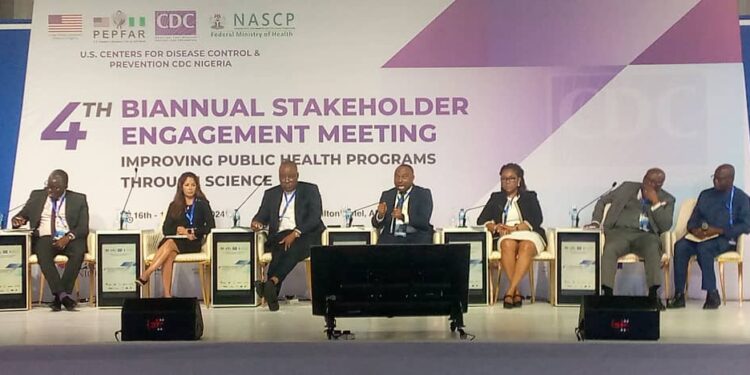By Samson Adeyanju
Country Representative, World Health Organization, Walter Kaadi Mulombo has said the US Embassy remains committed to working with Nigerian government on health matters especially in the areas of vaccine production to avoid a repeat of the COVID-19.
Speaking at during the 4th Bi-Annual Stake Holder Engagement themed ‘Improving Public Health Programs through Science’, the Rep called on all to support the course for good health in it’s entirety.
It is worthy to note that the Federal Government of Nigeria, in collaboration with the Centers for Disease Control and Prevention in Nigeria, together with Caritas Nigeria and other Implementing Partners are champion this campaign.
…NPHCDA to train 120,000 health workers in 2024
During the event, the National Primary Health Care Development Agency (NPHCDA) announced plans to train 120,000 health workers in 2024.
Dr. Muyi Aina, the Executive Director of NPHCDA, made this known during a presentation on the role of community health workers in disease control at the sub-national level.
The training aims to boost the capacity of frontline health workers in providing integrated health services and improving health outcomes in Nigeria.
The training will cover various areas, including disease surveillance, health education, disease prevention, and management, as well as community mobilization and advocacy.
The NPHCDA is collaborating with partners to implement the training, which includes lectures, participatory processes, simulations, and a hands-on approach.
The agency is also exploring the use of technology for subsequent trainings to ensure sustainability. The training will address challenges such as quality of schools, limited funding, and supervision, with a focus on integrating community health workers into the healthcare system for a more functional primary healthcare system in Nigeria.
On his part, the Commissioner for Health in Gombe State, Abu Dairu, highlighted the importance of a meeting of 12 states supported by CDC Nigeria.
He said meeting aims to review progress, set indicators, and develop sustainability plans for CDC projects.
Dairu emphasized the need for funding and political will to sustain these programs, noting challenges like human resource attrition. He expressed confidence in overcoming these challenges with provided solutions and commitment from stakeholders.
Speaking to Good Shepherd Newspaper in an interview, Dr. Temitope Ilori, the Director-General of the National Agency for the Control of AIDS (NACA), emphasized the importance of accurate data and science in responding to HIV/AIDS.
He debunked the misconception that AIDS is no longer a concern, stressing the need for continued awareness and testing.
Dr. Ilori highlighted global targets for HIV epidemic control by 2030, focusing on testing, medication access, and viral load control. He emphasized an integrated approach involving the health sector, non-health sectors, and grassroots mobilization, collaborating with communities and state governments to achieve these goals.
Also speaking with Good Shepherd Newspaper, Rev. Fr. Uchechukwu Obodoechina, the Executive Secretary of Caritas Nigeria, highlighted the organization’s multifaceted approach to HIV/AIDS, governance programs, and mental health services.
Over the past two years, Caritas Nigeria has positively impacted millions of lives, providing skills and empowerment to those infected with HIV and affected by the virus.
Rev. Fr. Obodoechina emphasized their commitment to intensifying activities in underserved and remote communities, ensuring that infected individuals receive the necessary support to accept their status and adhere to treatment.
Caritas Nigeria utilizes community mobilizers, engages stakeholders and religious groups, and collaborates with medicine patent dealers to reach and support those in need.
























